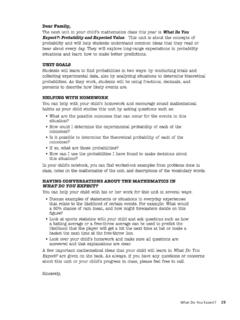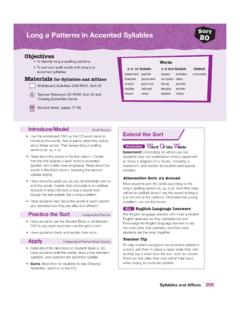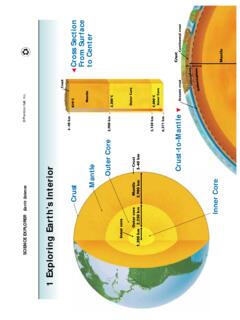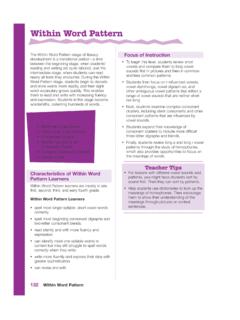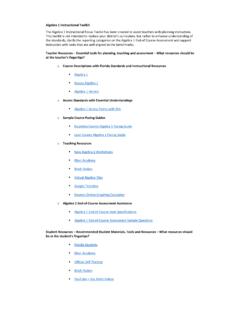Transcription of PRENTICE HALL ALGEBRA 1
1 Gatti Inc. Evaluation PRENTICE hall . ALGEBRA 1. ONLINE INTERVENTION. SYSTEM PILOT STUDY. PROJECT REPORT. 8-31-05. Gatti Evaluation Inc. Principal Investigator Guido G. Gatti Gatti Evaluation Inc. 162 Fairfax Rd Pittsburgh, PA 15221. (412) 371-9832. Fax: (412) 371-3560. Primary Stakeholder Funded by PRENTICE Hall1, pearson Education Inc. For Information From Primary Stakeholder Please Contact: Marcy Baughman, Director of Educational Research (617) 671-2652. Consulting Team2. Tse-chi Hsu Gregory Schraw Steve Lehman Marty Cohen Terry Goodman 1 2 Tse-chi Hsu PhD, Research Methods Expert [Professor (emeritus), Research Methodology, University of Pittsburgh] Marty Cohen PhD, mathematics Curriculum & Instruction Expert [Professor, mathematics Education, University of Pittsburgh] Terry Goodman PhD, mathematics Curriculum & Instruction Expert [Professor, mathematics Education, Central Michigan State University] Gregory Schraw PhD, Curriculum & Instruction Expert [Professor, Department of Educational Psychology, University of Nevada Las Vegas] Steve Lehman PhD, Educational Technology Expert [Assistant Professor, Department of Psychology, Utah State University].
2 2. Gatti Evaluation Inc. TABLE OF CONTENTS. FACE 1. STAKEHOLDERS AND CONSULTING 2. TABLE OF 3. EXECUTIVE 4. I. 5-6. Specific 6. II. 7-11. Experimental 7-11. Experimental Outcome Measures And Data 11-14. III. 14. IV. CONCLUSIONS AND 16-17. 17. TABLES .. 1a. Ninth Grade High School ALGEBRA Student Demographic Statistics for Western Pennsylvania Urban School 8. 1b. Seventh, Eighth, And Ninth Grade Honors ALGEBRA Student Demographic Statistics for Northern Florida Urban School 9. 2a. ALGEBRA Readiness Assessment Statistics .. 12. 2b. ALGEBRA Achievement Assessment 13. 3. AOIPS Phase 2 Preliminary Study 15. FIGURES .. 1a. ALGEBRA Readiness Assessment Score 18. 1b. ALGEBRA Achievement Assessment Chapters 1-3 Score 19. 1c. ALGEBRA Achievement Assessment Chapters 4 & 5 Score 20. 1d. ALGEBRA Achievement Assessment Chapters 6 & 7 Score 21. 1e. ALGEBRA Achievement Assessment Chapters 1-3, 6 & 7 Score 22. A1. Covariance Structure Model for Estimating Error Free Treatment Versus Control Group Achievement Gain 23.
3 3. Gatti Evaluation Inc. E X E C U T I V E S U M M A R Y. Does regular use of the PRENTICE hall online ALGEBRA curriculum result in higher ALGEBRA achievement? Objective To further assess the effectiveness of the PRENTICE hall ALGEBRA online mathematics curriculum. Participants Two urban public school districts; one in western Pennsylvania to provide the below grade level students, and one in northern Florida to provide at-and above grade level students for contrast. Methodology The study teachers received training in the proper use of the online curriculum and then administered an assessment of ALGEBRA readiness. The treatment classes then continued with a series of supervised in-school 40-minute lab periods once per week. ALGEBRA achievement was assessed for the content covered in chapters 1-3 at the end of phase 1 and chapters 6 and 7 at the end of phase 2. All treatment and comparison classrooms used the same PHA curriculum for the entire school year.
4 The study utilized powerful statistical models (see Appendix A) to analyze the data collected from the two phases that can provide evidence for persistent comparative achievement gains or illuminate gains that emerge over time. These models estimate treatment effects that are corrected for measurement error and adjust for baseline differences while controlling for the bias that naturally occurs from these baseline differences. Results Results indicate that when properly and fully utilized and/or used in conjunction with the online textbook, the AOIS can increase ALGEBRA achievement scores for below grade level urban district students. (see Table 3). The 9th grade students jointly instructed by both the AOIS and online text out-gained their bound book text and written assignment only classmates by an average of 20 percentile points across the material for 5 chap- ters. At the start of the school year, this class tested 20 percentile points below their fellow students, and with the aid of the online curriculum they tested at par with the comparison classroom.
5 Teachers also saw average percentile point gains of 33 and 28 percentile points, over their comparison classrooms when using the AOIS. and online textbook across smaller portions of the school year's material. When the AOIS was utilized to its full potential, students could expect to see average gains of 25 percentile points over those students making little or no use of the AOIS. These results show that the teachers were able to make effective use of the online curriculum, both the AOIS as a formative assessment and practice tool and the online text as an interactive re-teaching and a remediation resource. 4. Gatti Evaluation Inc. I . I N T R O D U C T I O N. Gatti Evaluation started evaluating pearson Education's ALGEBRA 1 online curriculum system in classrooms from two states in the fall of the 2004-2005 school year. The online curriculum follows the PRENTICE hall ALGEBRA 1 curriculum (PHA) and consists of the interactive online textbook and the ALGEBRA online intervention system (AOIS3).
6 The AOIS is a computer-based, assessment driven, ALGEBRA intervention with assessments and a student tracking system that may be accessed alone or used in combination with the interactive textbook. The pearson Learning Group division of pearson Education is currently developing an online mathematics remediation intervention that will also be offered with the online PRENTICE hall mathematics curriculum. The PRENTICE hall online curriculum is designed to help teachers make better use of assessment in their instructional decision-making. Research has shown that making assessment an integral part of instructional practice is associated with improved student learning (NCTM 20004). The National Council of Teachers of mathematics (2000) also emphasizes that technology enhances mathematics learning and supports effective mathematics teaching. To this end the PHA. online curriculum provides feedback to students about their thinking, helps students visualize difficult-to-understand concepts, and addresses the need for sufficient practice of important skills and ideas.
7 Although both formative student achievement assessment and educational technology may be skillfully combined to create an intervention that significantly increases achievement, poorly designed products will provide no more benefit than that of a paper text book and may even be detrimental. A poorly designed product can confuse and frustrate students and teachers - proving to be a waste of valuable learning time. For this reason it is always necessary to pilot test these new products for design improvements and best practice methods. The individualized student tracking format of the online curriculum should ease the burden of regularly testing entire classrooms by automatically providing the teacher with student progress reports on each skill assessed. The system also provides individualized re-teaching and re-testing of non-mastered skills by suggesting further online educational activities. Activities may also be assigned to individual students or entire classes.
8 Interactive online activities are offered in the form of chapter imbedded tutorials and games, along with teaching videos clips, audio vocabulary clips, and downloadable post script worksheets. Tests and activities can be searched by both chapter and National Assessment of Educational Progress (NAEP) or state educational objective. 3 pearson Education (2004). Math Online Intervention: Putting Research into Practice, Grade 1 Through ALGEBRA . pearson Education Inc. 4 National Council of Teaching of mathematics (2000). Principles and Standards for School mathematics . Reston, Va.: National Council of Teachers of mathematics . 5. TL1. Gatti Evaluation Inc. The AOIS assessments offer static sets of questions from the PHA textbook's chapter reviews, chapter tests, and checkpoint quizzes online in the form of multiple choice chapter vocabulary tests, chapter diagnosing readiness tests, chapter review tests ( , split up by lessons), and check point quizzes ( , two quizzes per chapter) with additional re-tests for each.
9 Benchmark tests ( , every two chapters) designed to be aligned to NAEP or state educational objectives are also offered. Test, re-test, and benchmark test results are tracked individually in each student's online profile along with those online activities accessed. In the first and second phases of the evaluation data was collected to address the research question, does regular use of the online ALGEBRA curriculum result in higher ALGEBRA achievement? Phase II is a continuation of the pilot study started in the Fall of 2004 intended to further assess the effectiveness of the PRENTICE hall ALGEBRA online mathematics curriculum5. PRENTICE hall 's parent company, pearson Education, is funding the pilot study, covering costs for developing ALGEBRA achievement assessments, site recruitment, data collection, onsite training, and providing on-going technical support. pearson Education also worked with the Wisconsin Center for Educational Research (WCER) and Gatti Evaluation to improve the quality and alignment to state standards of the grades 3 to ALGEBRA mathematics benchmark tests6,7.
10 Specific Aims Data was collected to further address the efficacy of the PRENTICE hall online ALGEBRA curriculum, specifically in effecting increases in achievement for students previously performing below grade level in mathematics . The main research question was: Do below grade level ALGEBRA students making regular use of components offered with the online ALGEBRA curriculum, under controlled conditions over the course of several months and across diverse algebraic skills, demonstrate higher achievement and skill mastery as evidenced by statistically and practically significantly higher achievement test scores? Do below grade level ALGEBRA students making regular use of components offered with the online ALGEBRA curriculum, under controlled conditions over the course of several months and across diverse algebraic skills, demonstrate higher achievement and skill mastery as evidenced by statistically and practically significantly higher achievement test scores?

